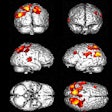Dear Molecular Imaging Insider,
Chimeric antigen receptor T-cell (CAR-T) therapy is among the latest promising immunotherapy treatments for patients with advanced lymphoma, yet few methods are available for tailoring individual treatments, according to a team at the Mayo Clinic in Rochester, MN. To that end, the group developed a score based on F-18 FDG-PET/CT that can identify which patients undergoing CAR-T therapy may need to be treated more aggressively. You can read about it here in this edition's Insider Exclusive.
PET/CT also plays a pivotal role in other new cancer treatments. For instance, a group led by researchers at University of California, Los Angeles recently validated a PET/CT imaging approach for assessing how prostate cancer patients receiving Pluvicto treatments respond to treatment.
We're also reporting on how PET is being used in applications in other fields, from psychology to the environment:
- A group in Finland used PET brain imaging to reveal a potential treatment target for men with orgasm disorders.
- City University of New York researchers suggested that PET imaging may be able to help assess the threat that microplastics pose to human health.
In addition, PET imaging continues to play a key part in recent developments in Alzheimer's disease. For one, with new treatments recently approved and others on the horizon, the U.S. Centers for Medicare and Medicaid has proposed covering amyloid PET scans for diagnosing and managing prospective patients. Moreover, an international group of experts recently drafted new diagnostic criteria for Alzheimer's disease based largely on brain PET imaging.
Speaking of brain PET, a group in Switzerland found that tau-PET scans appear to be better than all other neuroimaging approaches for predicting cognitive decline in Alzheimer's disease patients.
In the past month, we've posted several stories on AI research in molecular imaging, and while these are early studies, researchers are suggesting the technology has significant potential. For example, according to a group in Taiwan, an AI model based on SPECT images has the potential to help nuclear medicine physicians identify kidney defects in children, and another team, this one in Germany, has developed an AI model for PET imaging that could help clinicians determine whether patients are responding to brain tumor treatments.
Finally, we noted that due to production delays, Canada is facing a shortage of dypyridamole -- an agent used in SPECT myocardial perfusion imaging. We also noted that a group at McMaster University in Hamilton, Ontario, has explored mitigating supply chain delays with the use of drones to deliver radiopharmaceuticals.
That's all for now. For more news, be sure to check in regularly with our Molecular Imaging Community!





















